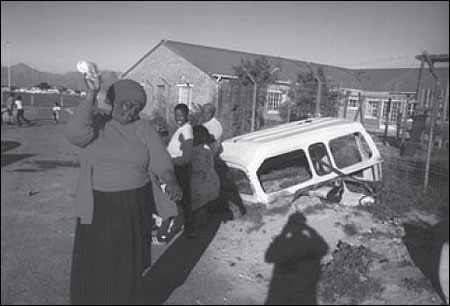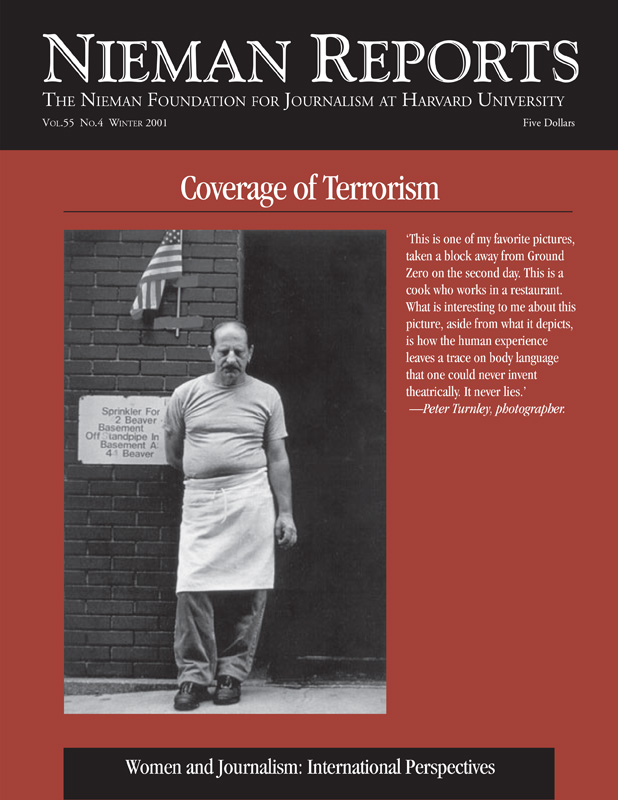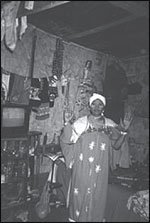
Khayelitsha township, Cape Town. Photo by Monica Bekwapai.
While there are a good number of women who work in the media in Africa, their impact is still not yet significant. To some extent, the reasons emerge out of the cultures in which these women work. But other challenges seem more a by-product of the ways in which these occupations operate and the skills that are required and rewarded. For example, some attributes are admired and encouraged in men, yet seen as unacceptable in women. And when the media focus on these qualities, it is women who are normally punished for having them. Perhaps this is most visible in coverage of politics: Women who “play” the media are seen as being manipulative, while men are merely regarded as politicians.
Within the African media, many women who have achieved influential positions do not want to assist other women below them. Now that they are in high positions, they believe they should associate only with people who will further enhance their positions. They do very little to encourage, help and associate with other women. They literally turn a blind eye and deaf ear to discrimination going on around them.
And those people—men and women—who make decisions about media programming do not see a financial gain in focusing on women, so coverage of women does not become a priority. Programs targeted at women are dominated by stereotypical notions of women’s interests—such as taking care of the house. And women’s sports receive little attention, often none at all, yet women are very active in netball, basketball, tennis, even football. Nor is there much coverage of violence against women. As news, a story about rape is rare, and when it does appear, its presentation is stereotypic. Earlier this year, when a public message about rape was screened on South African TV, it raised such an uproar from men that it was finally removed from broadcast.
For those of us who work in community radio in Africa, the audiences we serve often have high rates of illiteracy. Therefore, radio is the primary source of information, and members of the media work hard to find ways for community members to participate in production of the news. Because of this, news coverage is mainly based on information deemed relevant by news broadcasters and the communities that they serve. Even though women form the majority of radio listeners, men still dictate what is listened to. Knowing this, the attitude in newsrooms remains very traditional and male dominated.
RELATED ARTICLE
"Community Radio Provides Women a Way to Have Their Voices Heard"
- L. Muthoni WanyekiAMARC Africa—through its Women’s Program—works with women in community radio to help empower them through training and other developmental programs.
When women are the subjects of news coverage, they are usually considered to be among the influential and powerful people in the society, such as cabinet ministers, members of Parliament (if they are vocal, otherwise they are not much noticed), high office officials, women married to important men, and beauty queens. Ordinary women only are considered news when something they’ve done is “bad” or when they do something more than “extraordinary.” There is little connection between women being in high places in the media and the coverage women, in general, receive. News coverage of women is more closely linked to an individual woman’s social status.
Are there ways to make things better, both for women who work in media as well as for coverage of issues of importance in women’s lives? AMARC is working with other stakeholders to urge those in positions of power within the media in Africa to operate gender-balanced management systems, programming and employment practices that oppose discrimination and that are open and accountable to all. Women in the media are also advised to advocate for gender and communication policies in their countries and to use lobbying, networking, training and research to fight for their equal representation and coverage of women’s lives.
Women journalists are being encouraged to become more active in their efforts to report stories with more realistic and positive portrayals of women. For instance, instead of covering violence against women in such a way that portrays women only as victims, coverage can focus on ways to alleviate this violence and also report on the perpetrator. And the few successful women in the media should work towards encouraging and supporting others. These women could start by joining and actively participating in women’s media associations whose main objective is to empower and raise the standards of women in the media.
Lettie Longwe is women’s program officer for AMARC Africa, a regional office for AMARC, an international non-governmental organization that serves the community radio movement on five continents.




